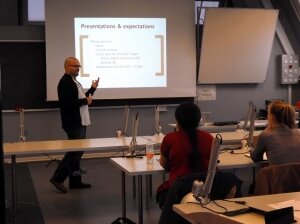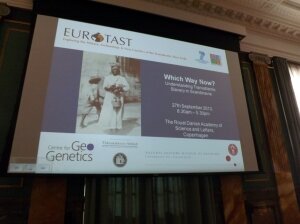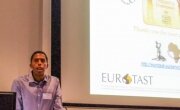Sept 2013: Network midterm in Copenhagen with career training and symposium on transatlantic slavery in Scandinavia
EUROTAST convened in Copenhagen for its midterm meeting and fourth network training initiative, which was comprised of a four-day career development workshop and symposium on the history and legacies of the transatlantic slave trade in Scandinavia.
1. Career Development workshop
 The skills training was organised by the EUROTAST coordinating team at the Centre for GeoGenetics, Natural History Museum, University of Copenhagen, in collaboration with Science Research and Innovation, and Humanities Student Services also at the University of Copenhagen. Sessions were led by Humanities careers advisor Mike Wenøe and Science Research advisors Chris Sturrock and Katja Pedersen. The aim of the four-day workshop was to explore and investigate the tools necessary for PhD fellows to negotiate postdoctoral research and career opportunities following the EUROTAST PhD fellowship. The workshop included discussions about the transition from PhD to professional life, skills assessment activities, conversations with prospective employers and a full day session on postdoctoral grant writing. Overall the programme provided a realistic overview of the core areas of focus for modern day researchers.
The skills training was organised by the EUROTAST coordinating team at the Centre for GeoGenetics, Natural History Museum, University of Copenhagen, in collaboration with Science Research and Innovation, and Humanities Student Services also at the University of Copenhagen. Sessions were led by Humanities careers advisor Mike Wenøe and Science Research advisors Chris Sturrock and Katja Pedersen. The aim of the four-day workshop was to explore and investigate the tools necessary for PhD fellows to negotiate postdoctoral research and career opportunities following the EUROTAST PhD fellowship. The workshop included discussions about the transition from PhD to professional life, skills assessment activities, conversations with prospective employers and a full day session on postdoctoral grant writing. Overall the programme provided a realistic overview of the core areas of focus for modern day researchers.
2. Symposium: Which Way Now? Understanding Transatlantic Slavery in Scandinavia (27th September 2013)
From the mid-seventeenth century until 1802 Denmark-Norway was one of several maritime nations who participated in the Transatlantic Slave Trade. Their ships transported at least 100,000 enslaved Africans to the Caribbean islands of St. Croix, St. Thomas and St. John, which remained Danish colonies until their transfer to the Unites States of America in 1917. Although Denmark and other Scandinavian countries participated in the Trade, there has been little public discourse around these histories and their modern legacies. However, Denmark is currently preparing for its centennial commemorations of the transfer of the Danish Virgin Islands in 2017, and knowing this the EUROTAST coordinating team in Copenhagen saw its midterm event in the city an ideal moment to contribute to early discussions and thinking. The network therefore convened an interdisciplinary symposium to explore Scandinavian research and perspectives in science, anthropology, heritage, media and contemporary art to expand the current dialogue on slavery and the public past in a European region that is lesser known in the context of this history.
The keynote for the day was given by Erik Gøbel, the senior archivist at the Danish National Archives and keeper of collections relating to the former Danish Virgin Islands. Providing a contextual overview for the day’s discussions, Dr Gøbel outlined Denmark’s colonial history, explored the statistics relating to the country’s involvement in the transatlantic slave trade, highlighted critical scholarship that has been conducted so far, and reflected on specific initiatives at the National Archives that will be included as part of 2017 commemorations. This overview provided a critical frame for the day of talks and discussions which interrogated heritage interventions and pedagogical practice with contested themes and histories; explored current interdisciplinary research in the sciences and humanities; and reflected on the social and political challenges of engaging in slavery discourse in Scandinavia as well as living as an African descendant in relatively homogenous societies.

The discussion was fascinating and informative, presenting new perspectives on a history that has so often been told in the context of larger colonisers such as Britain, France and the Netherlands. Conceptually the day was underpinned by an awareness that this history and its legacies (even the act of commemoration) are informed by processes of inscription and erasure – opposing drives to exclude and to belong – which were themes reflected in the artist intervention made by Jeannette Ehlers. But the question of the day’s symposium “Which Way Now?” was challenging to answer. Initially posed as a way of encouraging qualitative guidance for the years of Denmark’s planning towards 2017, it became clear that there was a sense of caution in telling “black and white” stories that are difficult to negotiate – focussing on historical wounds and contemporary intolerances that are largely ignored in Denmark. The question then was not necessarily answered by clear directives but rather by the determination of the day’s contributors whose work and perspectives are dynamically shifting the retelling and revision of history’s ills, one intervention at a time. Ultimately the question seemed to be answered not as a matter of isolated deliverables, but rather as an energy of expanding continuity.
The outstanding programme included fascinating talks by leading and new voices in research, arts and culture, heritage and education; from Denmark, Sweden and Iceland. They were:
Erik Gøbel (Danish National Archives)
Benjamin Asmussen (Maritime Museum of Denmark)
Mette Boritz (National Museum of Denmark)
Jette Sandahl (City Museum of Copenhagen)
Jeannette Ehlers (Denmark)
Ulla Lunn (Lunn & Co. Architects, Denmark)
Agnar Helgason (DeCode Genetics, Iceland)
Gísli Pálsson (Department of Anthropology, University of Iceland)
Gunvor Simonsen (SAXO Institute, Copenhagen University)
Jens Soelberg (Museum of Natural Medicine, Copenhagen University)
Alex Frank Larsen (Documentary filmmaker, Denmark)
Patrick Gibson (Co-Author of ‘Svart i Sverige’/’Black in Sweden’)
Cecilia Henriksson (Co-Author of ‘Svart i Sverige’/’Black in Sweden’)
Astrid Nonbo Andersen (Department of Culture and Society, University of Aarhus)
Mary Consolata Namagambe (AAfroscandic blog, Denmark)
The full symposium programme can be downloaded HERE.
3. EUROTAST Formal Mid-Term Meeting
This meeting is a formal requirement from the EU funding program, and acts as a forum in which the Brussels based project officer, and an external expert reviewer, meet with the full network participants to discuss overall network progress so far and also future plans. Key components of the meeting included 10-minute talks by the Postdoc and PhD fellows, a closed meeting between the evaluator and the fellows, and a full network discussion.
– Post by Temi Odumosu


